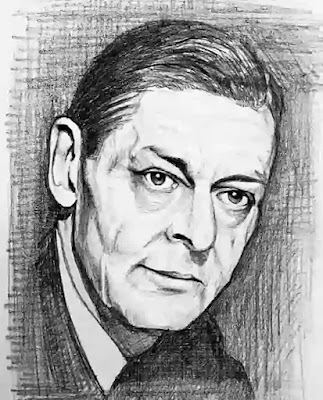Also Read
Eliot's originality : T. S. Eliot is the representative figure of the twentieth century. His literary career extended over a period of forty-five years. He dominated the English literary scene. He wielded wide authority and influence. He has been considered "Pope of Russel Square." No other English poet of this century has shown such originality and versatility. His greatness as a poet is an admitted fact. He is, in fact, part and parcel of the English literary tradition. He has modified and enriched the English tradition for the benefit of the coming generation. His impact on younger generation has been more wilder and more comprehensive than that of any other men of letters of our time.
 |
| T. S. Eliot |
Eliot's influence on his contemporaries : Eliot's influence has been complex and varied. He has given impetus to a number of poets to experiment with new forms. Eliot's successors owe him a special gratitude. According to G.S. Frazer, "Eliot is a craftsman who has provided his successors with new, sharp tools and as a teacher from whom they have learned how to use the tools and how to keep them clean." The contemporaries of Eliot, like Louis Macneice, C. Day Lewis, Stephen Spender, and Auden etc., show the influence of the style and imagery of The Waste Land. Images like, "a patient etherized upon the table" have become the common stock in trade of succeeding poets.
Eliot's universality : Eliot was a spokesman of his age. He expressed the dominant anxieties and feelings of his age. As Kathleen Raine remarks: "It is not every poet who has taken upon himself to experience and transmute such a great weight of human life and suffering, or who has found himself compelled to be the prophet of truths so terrible."
Although he is the physiuian of his age who endeavours to cure the diseased mind of modern life, yet he universalises contemporary predicament and consequently it becomes a part of the human predicament in every age and country. Dr. A.G. George remarks: "His great claim to originality consists in his recognising the artistic possibilities of the belief that anguish and sinfulness are intrinsic of human nature." so the artistic qualities of T.S. Eliot make him a universal figure.
A Great Innovator of the English Language : When T. S. Eliot started writing, he found English language dead. He started revolt against the descendant and exhausted poetry of his date. He completely broke from the thinned-out romantic tradition. As R.A. Scott James remarked: "Just as Joyce in his way, and Dorothy Richardson and Virginia Woolf in their ways, had felt the necessity of a new mode of writing to express their inner sense of the passing show and the realities behind it, so was with Eliot." In the decadent period poetry became stereo-typed. It was remote from the living language of the people. Like Donne and Wordsworth, Eliot was a great architect of the English language who endeavoured to restore it to life and vitality. His technique was to bring language into contact not only with current speech but also with European literary tradition. He made English language so rich that it became a suitable instrument for the expression of the complexities and intricacies of contemporary urban life. Thus he has broken from the nineteenth century tradition and given a new direction to English poetry.
Eliot's use of new techniques : Eliot adopted and developed new techniques of communicating his views. He communicates his sense of the modern predicament by the use of conversational rhythms and imagery which he has drawn from urban life. He was a great innovator. When we consider his use of symbols, the use of implication, the use of myths as objective co-relatives, his use of the mythical method for juxtaposing of the past and the present in his poetry, is highly commendable tor communicating his sense of the modern predicament. By the help of new techniques, he has telescoped in a few lines the whole ages and world-civilizations. His art of condensation and compression has enabled him to judge the present in its proper historical perspective. Although his new techniques cause difficulty and perplexity for the readers, yet he has given a new direction to English poetry by breaking it away from the nineteenth century tradition.
Conclusion : T.S. Eliot's influence has crossed all the frontiers of languages and lands. His touch, to-day, is felt in the poetry and criticism all over the world. No poet or critic since Coleridge has ever enjoyed such an authority and distinction. Eliot is a poet, a playwright, a critic and a publicist. In every branch of literature that he has touched, he has left the stamp of a genius. He has saved English poetry from its silly nostalgic ways and has brought back its intellectual dignity. England in the twenties got itself expressed in his poetry. His poetry presents his efforts to harmonise the personal and the impersonal in poetry. Eliot is the representative of the modern mind, keenly aware of his surroundinggs and its problems and of the needs of contemporary poetry, therefore, has a new way of expression, a new speech. His critical writings attempt at the correction of popular taste and offer a new way of appreciation and evaluation of literature. His plays also present a case for the revival of the poetic drama.